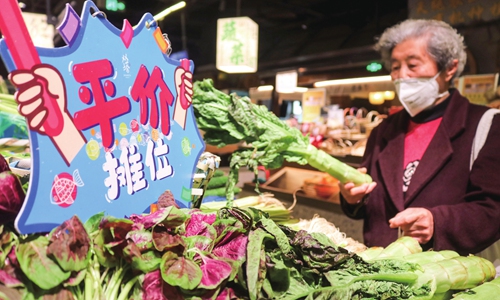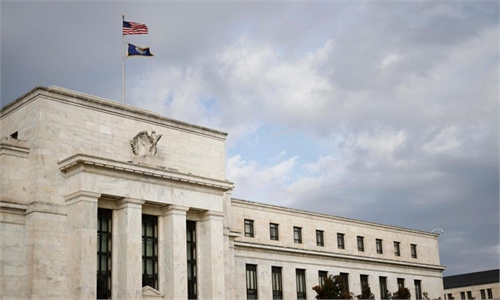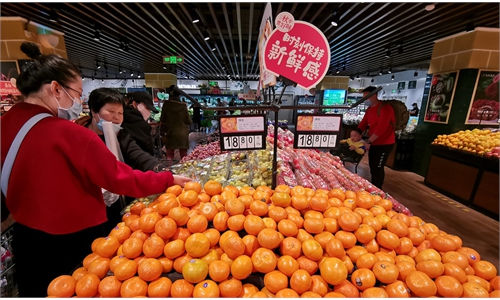
A citizen shops at a "cheap vegetable stall" at a local market in Gusu District, Suzhou, East China's Jiangsu Province on April 18, 2022. The local government has launched 21 agricultural markets to sell cheap vegetables for the benefit of the public while also setting up 127 "cheap vegetable stalls" for anti-epidemic and supply guarantee needs. Photo: cnsphoto
While major economies such as the US and the EU are grappling with record high inflation, China will see its consumer price index (CPI) remain in a reasonable range, and is capable of attaining its 3-percent annual target despite the fallout of COVID-19 resurgences and the Russia-Ukraine conflict, a senior Chinese official said on Thursday.
Due to soaring international energy and grain prices since the beginning of this year, the US and the EU saw their domestic inflation rates stay above 8 percent in recent months, with the US' CPI quickening to a fresh 40-year record of 9.1 percent in June.
"In stark contrast, China's CPI persistently runs within a reasonable range, with the index rising 1.7 percent in the first half of the year, significantly lower than other major economies," Wan Jinsong, director of the Price Department at the National Development and Reform Commission (NDRC), said at a press conference on Thursday.
Fully reflecting the advantages of socialism with Chinese characteristics as well as the country's remarkable achievement in ensuring the supply of important livelihood products and key bulk commodities, China's food prices have risen only about 1.4 percent since the start of the Russia-Ukraine conflict, far lower than the US' and the EU's price hikes of 7.5-9.5 percent, according to Wan.
Meanwhile, the prices of electricity and gas for residential use in China maintained basic stability thanks to measures to increase coal supply and ensure reasonable coal prices, Wan said, noting that major economies, however, saw sharp price rises. For instance, the power price in the eurozone jumped about 30 percent year-on-year in May, while the natural gas price surged around 50 percent, he said.
Apart from factors such as China's prudent monetary policies, China's capability in stabilizing goods prices by adjusting supply also contributed to a low but reasonable CPI level in China, Li Changan, a professor at the Academy of China Open Economy Studies of the University of International Business and Economics, told the Global Times on Thursday.
"The central government is good at adjusting the prices of basic commodities, such as oil and minerals, as well as food by releasing reserves when it's necessary or taking other measures," Li said.
In a bid to attain this year's CPI goal, the NDRC will continue to closely follow overall consumer prices and the price trends of key commodities, strengthen market adjustment and boost the implementation of policies for stabilizing consumer prices, Wan stressed.
Although the global grain market is facing volatility and increasing uncertainty due to the impact of a variety of factors including the pandemic, extreme weather and major developed economies' monetary tightening, "we have the capability, confidence and conditions to deal with external shocks and hold our rice bowls firmly in our own hands," Zhang Guohua, deputy head of the economic and trade department at the NDRC, said at the same conference.
China saw another bumper summer harvest this year. According to NDRC data, 34.33 million tons of wheat had been harvested in major planting areas as of Sunday, up by 1.6 million tons on a yearly basis.


